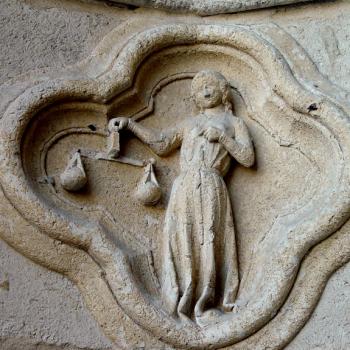
We are told in Scripture that it is God, not us, who is to act as the judge. We are also told, when Jesus comes again, he will judge the living and the dead. Taking the two together, we can conclude Jesus is God. It is Jesus who has the right to judge; anyone who presumes to take on that role and condemn others try to act as if they are God when they are not. Jesus is the just judge. He knows all that is within all of us, all that we have hidden from others and even ourselves. He will reveal it all when he brings the light of judgment upon us. Until then, we must await the judgment of Christ. Jesus knows what we do not know, which is why we should never judge others, especially in regards their eschatological fate:
Therefore do not pronounce judgment before the time, before the Lord comes, who will bring to light the things now hidden in darkness and will disclose the purposes of the heart. Then every man will receive his commendation from God” (1 Cor. 4:5 RSV)
Often, when we judge others, it is because we dislike something about them, and so we judge them as a way to show our displeasure. This attitude, this desire, has us show little care or concern towards the one we judge, leading us to be unjustly harsh and cruel. We don’t consider their well-being when we make our judgment call; instead, we consider our own wants and interests and how to have them realized in the world. We might trick ourselves into thinking we are doing what we do out of love, but in reality, it is our own selfish desires which motivate us. Sadly, so many Christians have been led to believe that this is the right way to deal with the world, that they are expected to look out and find all wrongdoing and condemn it, and if we don’t, that means we stands with sin. Again, it is clear, not all sin is treated this way. Our own sins certainly are not. It is rather those which we dislike seeing in others which get our ire. It is this attitude which causes problems, indeed, which creates a stumbling block, not just for those we judge, but for those who are not Christians, as they look at what we are doing, think it is what Christianity is about, and want nothing to do with it. Our actions are all about pushing people down, never giving any mercy, any means for hope, all the while acting as if we are doing this in the name of Christ. Paul, however, tells us to do the opposite. “Then let us no more pass judgment on one another, but rather decide never to put a stumbling block or hindrance in the way of a brother” (Rom. 14:13 RSV). When we judge, our judgment reveals more about ourselves than about the one we judged, for our hidden darkness makes itself clear to others, revealing how far we are from the true law of God:
Do not speak evil against one another, brethren. He that speaks evil against a brother or judges his brother, speaks evil against the law and judges the law. But if you judge the law, you are not a doer of the law but a judge. There is one lawgiver and judge, he who is able to save and to destroy. But who are you that you judge your neighbor? (Jas. 4:11-12 RSV).
Many might say in reply to this, “Should we not warn others about their sin? Shouldn’t we tell people they have done wrong when they have done so, for then they will be able to know it is wrong and stop doing it? Isn’t that the charitable thing to do?” No, because, though we try to tell ourselves we judge others out of charity, our actions prove it is all about trying to enforce our own desires upon others. We do not look to and correct every sin (which would, of course, be problematic if we did); we are selective in our outrage, and we mostly select those vices which have the least amount of influence in our lives, because they disgust us the most, or those which we have the strongest connection to, those which we do, and do often, but we want to prove ourselves superior to them by fighting them when we see others do them. We act in accordance to our own interests and desires, not to the greater good. We want to make others follow after us and our desires, to show we have power over them. Thus, when we suggest we judge others out of charity, we do that as a way to excuse ourselves, to justify what we should not be doing. It is a grave temptation, one which could be said to come from Satan, for Satan is said to be the accuser and wants to make us accusers as well. Knowing this, many great spiritual masters have told us to fight against such a temptation, making sure we do not accept its subtle attempts to have us justify a judgmental spirit:
If you are an eye-witness of your brother falling [into sin], say without hesitation: “A curse on you, Satan! My brother is not to blame,” and strengthen your heart against judging your brother, or the Holy Spirit will withdraw from you. [1]
Salvation is received through charity. We don’t save ourselves by judging others. Scripture gives us many examples of this, such as with the story of Lot. He lived the midst of Sodom and Gomorrah; while there, he showed hospitality and charity, never judging but trying to help those who came before him. It was this hospitality which saved him:
An elder was asked: “Why am I unable to live with brothers?” “Because you do not fear God,” he said. “If you would call to mind how it was written that, in Sodom, Lot was saved for having judged nobody, then you could set yourself to live amid wild beasts” [Gen 19:29]. [2]
Instead of judging others, we should show them love and care, bearing their pains and sorrows the best we can. The more we look to others to condemn them, the more we set up our own condemnation. It is pride which makes us judgmental; to confront such pride, we must embrace humility, making sure we do not think ourselves better than those around us. This is why tradition suggests we think of ourselves as the first among sinners. When we understand that in such a state, that is, being the first among sinners, we can receive mercy and grace, we should be able to realize everyone else can receive such mercy and grace as well. Therefore, instead of going out into the world to be a judge, looking for things to criticize and condemn, we should go out into the world to find ways we can help others, lifting them up instead of pushing them down, bearing their burdens instead of discounting their needs because we do not like what they do:
Bear ye one another’s burdens [Gal. 6:2]. How often it happens that, seeing the error or weakness of your brother, you count yourself better than him, you condemn him while you mourn in your heart his lack of wisdom. Meanwhile, if you do in fact see truly, then you must lay this onto your own conscience as well. The visible iniquity of your neighbor is also your own iniquity if you are not preoccupied with conquering it, and it will be required of you at the Final Judgment, as if it were your own iniquity [cf. Lk. 12:48]. We must have a merciful heart, we must hurt for and not judge the other. [3]
It is imperative we embrace mercy. It is imperative we embrace humility. It is imperative that we keep in mind that everyone in the world needs each other, that we are in this together. If we see someone sin, we should help them, bear the burden with them, instead of judging and condemning them. We should show them mercy, not judgment, love and compassion, and not hate and cruelty.
[1] John Wortley, trans., The Anonymous Sayings Of The Desert Fathers: A Select Edition And Complete English Translation (Cambridge: Cambridge University Press, 2013), 417 [N 592.39].
[2] John Wortley, trans., The Anonymous Sayings Of The Desert Fathers, 507 [N 627].
[3] Sergius Bulgakov. Spiritual Biography. Trans. Mark Roosien and Roberto J. De La Noval (Brooklyn, NY: Angelico Press, 2022), 92-3, [1/14.XI.1924].
Stay in touch! Like A Little Bit of Nothing on Facebook.
If you liked what you read, please consider sharing it with your friends and family!
N.B.: While I read comments to moderate them, I rarely respond to them. If I don’t respond to your comment directly, don’t assume I am unthankful for it. I appreciate it. But I want readers to feel free to ask questions, and hopefully, dialogue with each other. I have shared what I wanted to say, though some responses will get a brief reply by me, or, if I find it interesting and something I can engage fully, as the foundation for another post. I have had many posts inspired or improved upon thanks to my readers.
















